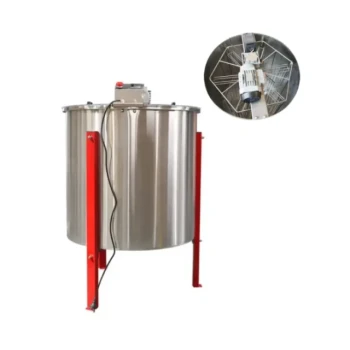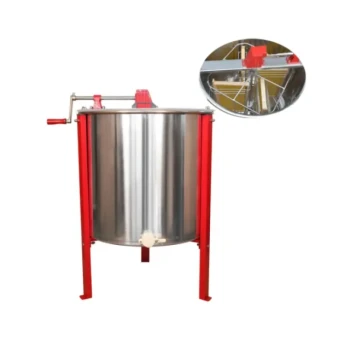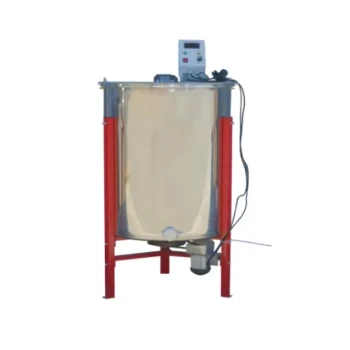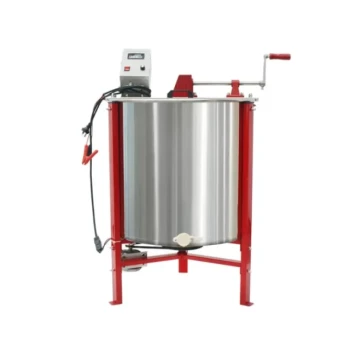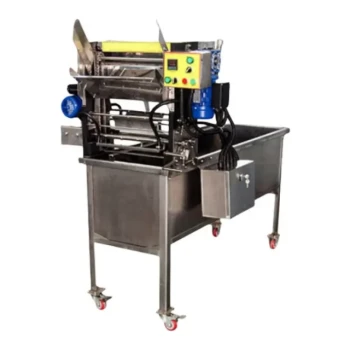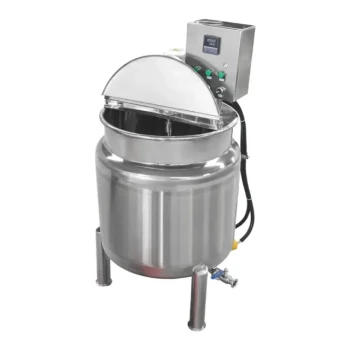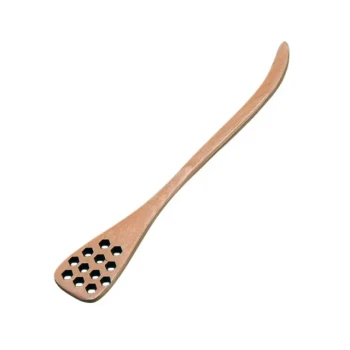For most beekeepers aiming for efficiency and high yields, a centrifugal honey extractor is better than a honey press. It allows you to extract honey quickly while preserving the delicate honeycomb, saving your bees immense time and energy on subsequent seasons. However, a honey press is the superior choice for small-scale operations, those who use natural or foundationless comb, or beekeepers who prioritize simplicity and low cost over speed.
The decision between an extractor and a press is not about which tool is universally "better," but about aligning your equipment with your specific beekeeping philosophy, hive type, and operational scale. The core trade-off is between the extractor's efficiency and the press's simplicity.
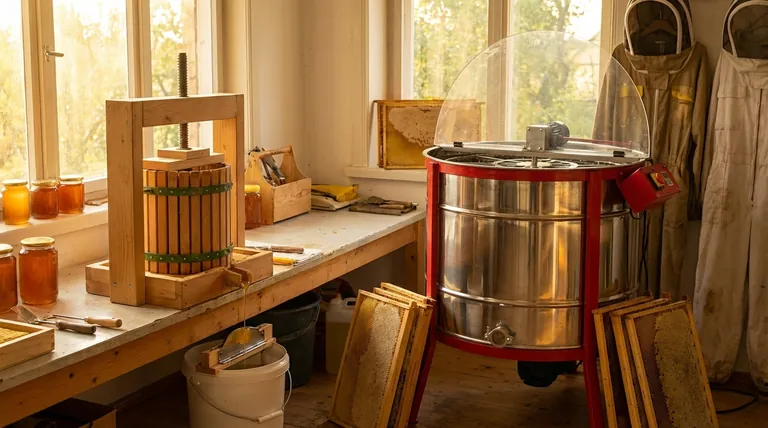
The Fundamental Difference: How the Honey is Removed
The primary distinction between these two tools lies in their method of extraction and, most importantly, what happens to the beeswax comb in the process.
The Honey Extractor: Preserving Bee Labor
A centrifugal honey extractor works like a centrifuge, using spinning force to sling honey out of the uncapped cells. The frames are placed inside a drum and spun, either by a hand crank or an electric motor.
This method's greatest advantage is that it leaves the drawn-out honeycomb intact. Because bees must consume roughly eight pounds of honey to produce one pound of wax, preserving the comb allows them to immediately start refilling it, drastically increasing the potential honey harvest for the season.
The Honey Press: The Crush and Strain Method
A honey press works by applying physical pressure. You cut the honeycomb from the frame, place it in the press (often in a filter bag), and squeeze the honey out, separating it from the wax.
This process, often called "crush and strain," destroys the comb. While effective for extracting honey, it means the bees must rebuild all of that comb from scratch, consuming significant energy and resources that could have otherwise been stored as surplus honey.
When to Choose a Honey Extractor
A centrifugal extractor is the standard for most modern beekeeping operations because it is purpose-built for productivity and scalability.
For Maximizing Honey Yield
By preserving the comb, you give your bees a massive head start. They can focus on foraging and honey production rather than wax building, leading to significantly larger harvests over time.
For Efficiency at Scale
Radial extractors, which hold frames like spokes in a wheel, can extract honey from both sides of multiple frames simultaneously. When paired with an electric motor, this makes the harvesting process incredibly fast and requires far less manual labor than pressing.
For Standard Langstroth Frames
Extractors are designed to work with standard, sturdy frames that often include wire or plastic foundation. This reinforcement is necessary to prevent the comb from blowing apart under the intense centrifugal force.
When to Choose a Honey Press
Despite the extractor's efficiency, a honey press is the ideal tool in several distinct scenarios.
For Foundationless or Natural Comb
If you practice beekeeping with top-bar hives, Warre hives, or use foundationless frames, your comb likely lacks the structural support to survive an extractor. A press is the only viable method to extract honey without making a mess.
For Small-Scale and Hobbyist Beekeeping
Honey presses are significantly less expensive, smaller, and lighter than extractors. For a beekeeper with only one or two hives, the high cost and large storage footprint of an extractor are often impractical.
For Portability and Simplicity
A press is easy to transport, set up, and clean. Its simple mechanical nature means there are fewer parts to maintain or break, making it a reliable and straightforward tool for honey harvesting.
For Specific Honey Products
The crush and strain method results in honey that may contain more pollen and fine wax particles. Some customers prefer this less-processed style of honey. The process also yields clean, rendered beeswax as a valuable secondary product.
Understanding the Key Trade-offs
Your choice has direct consequences for your time, budget, and the bees themselves.
Bee Energy and Resources
This is the most critical trade-off. An extractor preserves the bees' most valuable resource: drawn comb. A press requires the colony to expend significant energy to rebuild, reducing its capacity for honey storage.
Labor and Time
A press is more labor-intensive per frame because it involves cutting comb and physically squeezing it in small batches. An extractor is far faster for large harvests but involves a more significant setup and cleanup process.
Cost and Footprint
A honey press is a low-cost, low-footprint entry into honey harvesting. An extractor represents a more significant financial investment and requires dedicated storage space.
Versatility
A press is often more versatile. Many models can be used as a fruit press for making cider or wine, adding value beyond the apiary. Extractors, by contrast, have only one function.
Making the Right Choice for Your Operation
Choose your equipment based on a clear understanding of your beekeeping goals and methods.
- If your primary focus is maximizing honey production and efficiency: A centrifugal honey extractor is the correct tool, as preserving the comb is key to high yields.
- If your primary focus is practicing natural, foundationless beekeeping: A honey press is essential, as it is designed to work with delicate, non-standard comb.
- If your primary focus is low cost, simplicity, and you have only a few hives: Start with a honey press for its affordability, small size, and ease of use.
Ultimately, the right tool is the one that best serves your bees, your budget, and your beekeeping philosophy.
Summary Table:
| Feature | Honey Extractor | Honey Press |
|---|---|---|
| Best For | Commercial apiaries, maximizing yield | Small-scale, natural comb, hobbyists |
| Comb Preservation | Yes - Leaves comb intact for bees | No - Destroys comb (crush & strain) |
| Efficiency/Speed | High (especially electric/radial models) | Lower, more labor-intensive per frame |
| Cost & Footprint | Higher investment, requires storage space | Lower cost, compact and portable |
| Hive Type Compatibility | Standard Langstroth frames with foundation | Top-bar, Warre, foundationless frames |
Equip Your Apiary with the Right Honey Harvesting Solution from HONESTBEE
As a trusted wholesale supplier for commercial apiaries and beekeeping equipment distributors, HONESTBEE provides the durable, high-performance equipment you need to maximize your operation's efficiency and honey yield.
Whether you're scaling up with a high-capacity centrifugal honey extractor to preserve comb and boost production, or need reliable honey presses for natural comb operations, we have the wholesale solutions to meet your specific demands.
Let's discuss your needs and ensure you have the best tools for a successful harvest.
Contact our wholesale team today for pricing and equipment recommendations!
Visual Guide
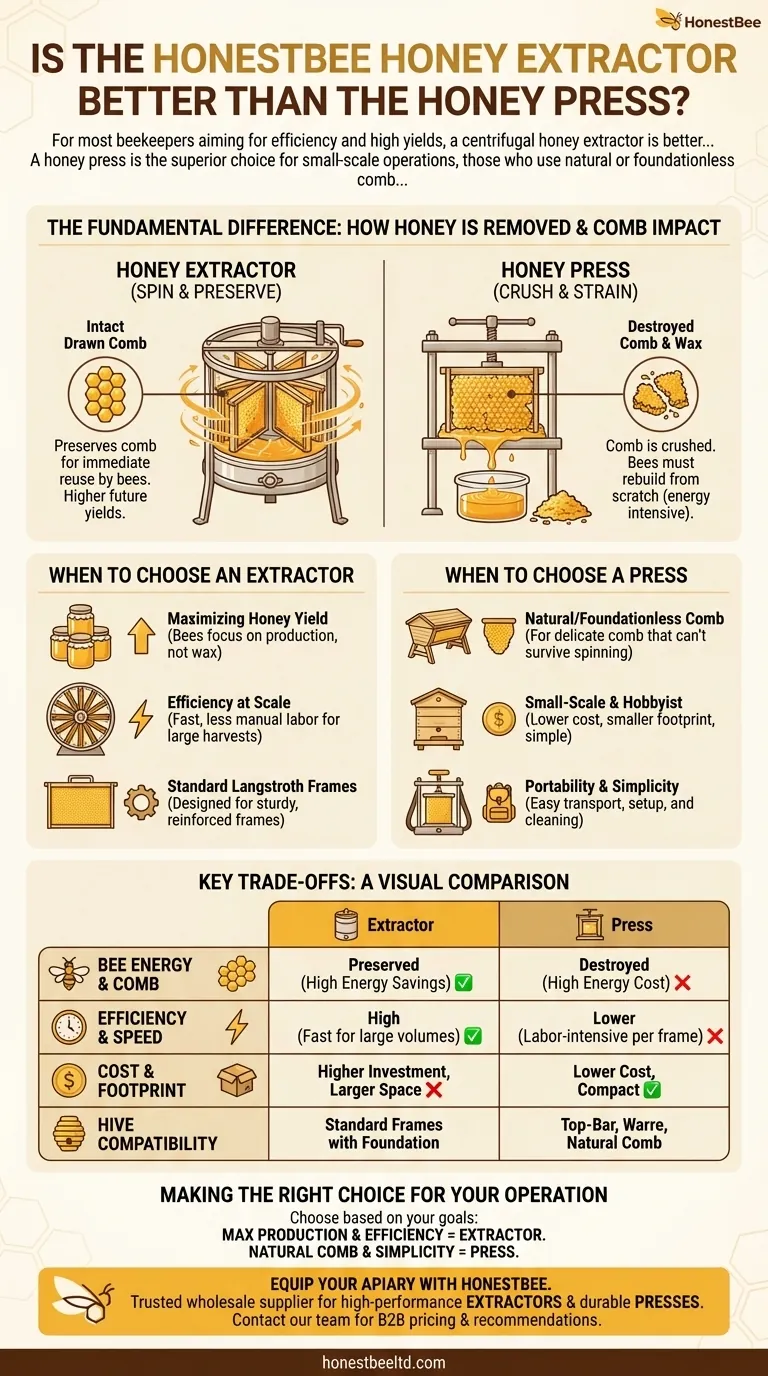
Related Products
- HONESTBEE 72 Frame Industrial Electric Honey Extractor for Beekeeping
- Electric 8 Frame Honey Spinner Extractor Equipment for Beekeeping
- 2 Frame Stainless Steel Manual Honey Spinner Extractor for Beekeeping
- HONESTBEE 6 Frame Self Reversing Electric Honey Extractor for Beekeeping
- HONESTBEE 4 Frame Manual Self Reversing Honey Extractor for Beekeeping
People Also Ask
- What are the advantages of automated honey extractors in terms of time efficiency? Boost Your Harvest Speed
- What is a machine used to remove honey from frames? The Complete Guide to Honey Extractors
- How long does it take to extract honey with an extractor? Plan Your Harvest for Maximum Efficiency
- What are some tips for efficient electric honey extraction? Optimize Your Workflow for Maximum Yield
- What is the energy consumption like for automatic honey extractors? Maximize Your Harvest Efficiency



